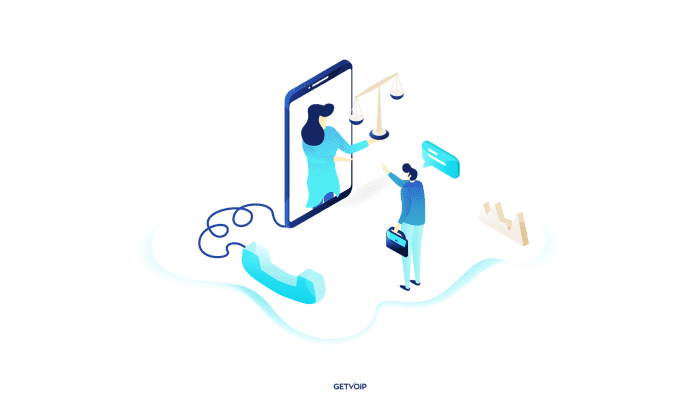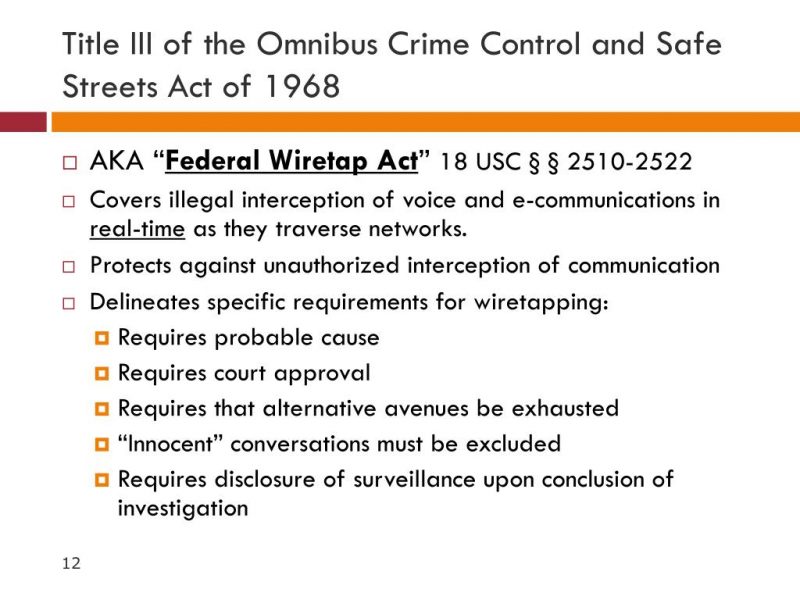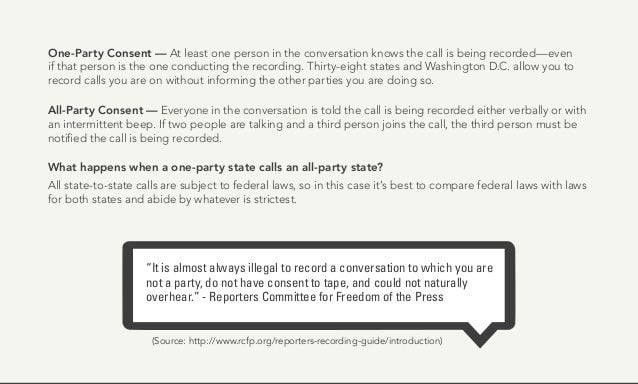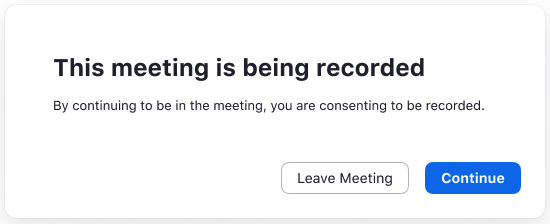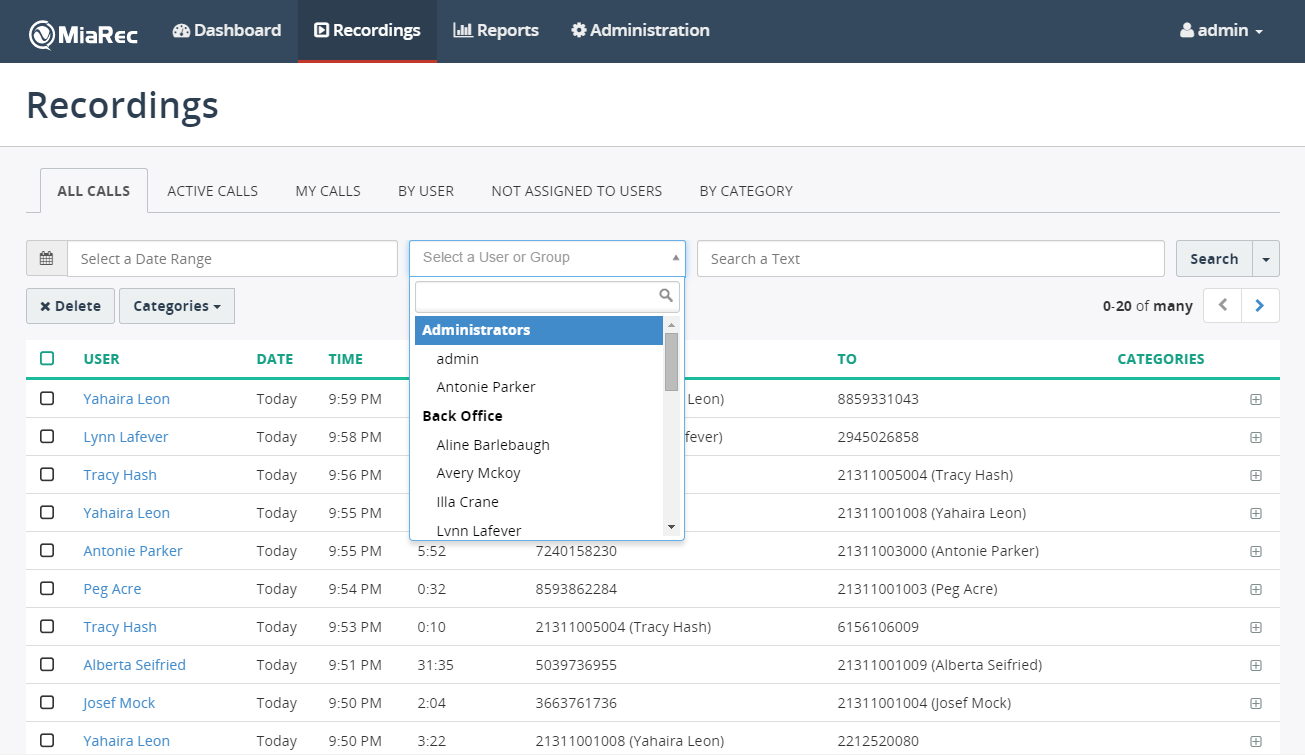Call recording laws under the Federal Electronic Protection Act outline the regulations surrounding informing and obtaining consent to record conversations that take place between two or more parties over the telephone.
Whether you’re recording business calls over your VoIP line to improve customer service, train and evaluate employees, or to have records of important conversations, understanding call recording legislation is essential.
Regulations and penalties for violations vary based on state, federal, and international legal requirements.
Table of Contents:
- Federal Laws on Call Recordings
- State Laws: One-Party Consent vs Two-Party Consent
- How To Notify Someone Of Call Recording
- Call Recording Etiquette Tips
- Call Recording Compliance and Security By Industry
- Penalties for Violating Call Recording Laws in the United States
- Understanding International Call Recording Laws
- Laws Regarding Storing Recorded Calls
- Call Recording Features To Look For
Federal Laws on Call Recordings
The Federal Wiretap Act of 1968 outlines United States laws regarding the recording of not only in-person conversations but also telephone calls and electronic communication recordings.
The Wiretapping Act prohibits secret recordings of conversations of any kind for which the person being communicated with has a reasonable expectation of privacy.
A “reasonable expectation of privacy” does not include conversations made in a public place where one can expect to be overheard by others. It would, however, include phone calls made within the privacy of your own home, or at a closed-door meeting.
However, under federal law, if one person expressly consents to the recording, or if the person recording the conversation has been legally authorized to do so (usually in the course of an investigation) recording calls is legal.
As of this writing, there is an exception for business telephones, which legally permits all employers to record phone calls on any phones that they have given to their employees.
Note that any state laws surrounding these records are subservient to the Federal law. This means that states cannot legally allow for secret communications within their jurisdiction.
State Laws: One-Party Consent vs Two-Party Consent
In addition to federal telephone recording laws, one-party consent and two-party consent (sometimes referred to as all-party consent) regulate recording calls at the state level.
Consent is either implied or directly given.
The FCC currently defines acceptable methods of consent as:
- Verbal or written consent before the recording begins
- Verbal notification before the recording starts
- Audible tones that are repeated at set intervals throughout a recorded conversation
For example, when you call into a customer service center, you’ll hear the familiar phrase, “This call may be monitored or recorded for quality assurance and training purposes.”
If you choose to remain on the line after this announcement, you have given your legal consent to being recorded. This is an example of consent by notification only. You never explicitly agreed to be recorded, but by staying on the phone, you’ve communicated that you consent to being recorded.
Before you dial into a phone conference, you may be asked to press a number on the phone if you consent to being recorded, or in stricter cases, even be emailed a consent form to physically sign. Both of these situations are examples of explicit “agreement,” as opposed to simply notification and implied consent.
So, who is able to give consent to be recorded?
One-party consent means that one person, either the person making the call or the call recipient, must be informed of and consent to the call being recorded. The majority of states are one-party consent states under Section 18 USC § 2511(2)(d) of the Electronic Communications Privacy Act, reviewed by the Supreme Court.
In addition to describing party consent law, the ECPA also covers privacy laws prohibiting the interception of private telephone conversations, eavesdropping, and the use of an undisclosed recording device.
One-party consent states include:
- Nevada
- New Jersey
- Wisconsin
- Colorado
- Arkansas
- Wyoming
- District of Columbia
- South Carolina
- New York
- Georgia
- North Carolina
- West Virginia
- North Dakota
- Rhode Island
- Louisiana
- Minnesota
- New Mexico
- Tennessee
- Nebraska
- Indiana
- Utah
- Maine
- Idaho
- Alaska
- Iowa
- Arizona
- Mississippi
- Missouri
- Ohio
- Oklahoma
- Texas
Two-party consent legally requires that both parties receive proper notification of and consent to conversations being recorded. These regulations must also be followed when recording conversations in two-party states between multiple people, like on conference calls.
Note that “two-party” consent is the same as “all-party” consent. This means that if you plan to record a larger conference call with numerous participants, you will have to make every attendee aware of the fact that they will be recorded before you begin.
Two-party consent states are:
- California
- Connecticut
- Florida
- Hawaii
- Illinois
- Maryland
- Massachusetts
- Michigan
- Montana
- New Hampshire
- Oregon
- Pennsylvania
- Vermont
- Washington
Some states have more complex recording laws than others, especially related to electronic and third-party recordings. The Digital Media Law Project provides an overview of more specific state-by-state recording laws.
Finally, note that only those who are participants in the conversation are legally allowed to record it. With the exception of a criminal investigation, if you record a conversation you’re not a part of, you are in direct violation of the wiretapping law.
Calls Between States
Interstate call recording laws are a bit more complicated, especially when someone from a one-party state plans on recording a resident of a two-party state.
What if, for example, someone from New Jersey -- a one-party consent state -- calls someone from Michigan -- a two-party consent state?
In most cases, the law defaults to the state laws within the area where the recording device is located. Therefore, in the above example, if the recording device is located in Michigan and not in New Jersey, two-party consent is required. If the recording device was in New Jersey, only one-party consent is needed.
Things get a bit more complicated, however, when determining whether these recordings are governed by state or local laws.
To place it safe, always default to the stricter option to protect yourself and your company from a lawsuit. Better yet? Cover all of your bases and get consent from every person involved in the call.
In this case, the law always defaults to the stricter option, meaning that both parties would need to give consent to being recorded.
If both caller and callee are located within the same state, state call recording laws will take precedence over federal ones -- meaning that, if the state is a two-party consent state, all parties will need to consent to be recorded.
How To Notify Someone Of Call Recordings
There are numerous ways to notify both employees and clients that their conversation will be recorded.
When hired, team members should sign an Employer Agreement clearly informing employees that their calls may be recorded. Records of these signed agreements should be kept on hand at all times.
The call recording notification announcement we referenced above is the most well-known method, but companies must be sure to evaluate their specific call path to ensure that all callers hear it in full before speaking to an agent directly.
Audible beep tones that last at least .17-.25 seconds and are played every 12-15 seconds are another way to notify callers that they are being recorded. However, this method is often distracting to those on the call and is therefore not recommended.
When making outbound calls, agents can show off their customer service skills by directly notifying the person on the phone that they’re being recorded by working it into their call scripts. A phrase like, “Hello, this is Jess from the Waxhaw Car Dealership calling you on a recorded line” is sufficient. Be aware, however, that agents must repeat the notification if the phone is passed off to another person.
Call Recording Etiquette Tips
Aside from the legality of recording phone calls, it’s a good business practice to set some basic company rules regarding recording etiquette.
Even if you have an automated recording notification, alert clients or coworkers in real-time before the conversation begins. Ensure that each person on the call clearly identifies themselves at the start of the conversation.
Make sure that you give the person you’re speaking with plenty of time, and avoid cutting them off in the middle of a conversation.
Not only is this polite, but rushed conversations, where everyone is talking over each other, are very hard to understand when reviewing the recordings later. If you don’t understand something the other person said, ask them to repeat it -- don’t assume it will be any easier to catch on the recording.
Check and maintain your earpieces and microphones regularly to ensure that speech is clear, and update outdated or low-quality equipment.
You may also wish to invest in noise-canceling recording hardware, especially if you live in an urban area or work in a noisy environment. Avoid poor service areas, rustling papers, chewing gum, and above all, eating, during a conversation.
Call Recording Compliance and Security By Industry
Though recording calls is one of the best contact center features to have, there are some industries whose compliance regulations actively require call recordings.
These industries include healthcare and HIPAA/HITECH compliance, accounting/finance, and telemarketing.
In addition to industry-specific laws around recordings, legal privacy requirements and precautions are often required.
Payment Card Industry Regulations
PCI and DSS compliance regulations help to guard against identity theft and keep bank/credit card information stored on open-source voice recording tools secure.
Any companies that store, transmit, or process payment information are required to follow these standards.
Though most customers today pay online, any payment information collected over the phone must be protected by a written privacy policy, frequent security system tests, and by providing access to cardholder information on a strictly need-to-know basis.
Call recordings may be stored and used to prove compliance with these regulations.
The Financial Sector
The 2002 Sarbanes-Oxley Act is a federal regulation regarding corporate accounting oversight.
Any company that must submit reports to the SEC can use call recording features to demonstrate that they are operating in accordance with the Act’s requirements, which include:
- CEO/CFO certification of finance reports
- A lack of insider trading
- The disclosure of ethical codes
- A lack of auditor conflicts of interest
FINRA and the SEC may routinely monitor or review phone call recordings to ensure that the laws are being followed.
The Telemarketing Sales Rule
The TSR was last amended in 2003, and it exists to protect against consumer fraud and privacy violations in telemarketing.
In short, this rule ensures that customers have received all the information that allows them to make an informed decision about the product or service being sold.
Companies required to comply with the TSR mainly use audio recordings to prove they are following legal requirements, which include disclosure of:
- Price and nature of goods/services
- Refund policies
- Credit card loss protection policy
- Seller’s identity and intent to sell
Penalties for Violating Call Recording Laws in the United States
Anyone who violates the Federal Wiretap Act can face up to five years in prison and/or a maximum fine of $500.
As with obtaining consent, additional penalties for violating voice and video recording laws vary from state to state and it is best to hire a local lawyer from a state where you're located.
In states like Alabama, Delaware, and Kansas, recording without obtaining proper consent is a misdemeanor. In states like Hawaii, Connecticut, and Kentucky, some violations can be classified as a felony.
Penalties can result in fines, lawsuits, jail time, and the loss of a business license.
Fines for these violations can range from $2,500 to $10,000 and more depending on the industry, state laws, and whether or not recording laws have been previously violated.
Civil parties in many states can also sue companies violating the law for up to three times the amount of damage done or $5,000 per violation -- whichever is the greater amount. Additionally, employers can sometimes be held legally and financially responsible if their employees have violated state recording laws.
Understanding International Call Recording Laws
In contrast with American telephone recording laws, the majority of the international community requires all-party consent before proceeding with a recording.
Below, we’ve outlined laws in the EU, the UK, Canada, and Australia.
The European Union
Since the GDPR went into effect in 2018, anyone wishing to record phone calls in/to the EU must prove that they are doing so for one of the following reasons:
- You have the consent of all parties to record
- Recording is required in accordance with a contract involving a call participant
- The call recorder’s legal obligations mandate recording the conversation
- Recording a call protects the interests of participants
- Recording has been legally authorized or is in the public interest
- Recording is of legitimate interest to the recorder
Additionally, the methods used to record the call, where call records are kept, and when the call recording will take place are legally required to be disclosed.
Note that specific countries within the European Union may also have unique requirements for recording phone conversations with call center software.
The United Kingdom
In the United Kingdom, all parties are required to be notified and give consent regarding recordings.
The only exceptions are if the person making the recording can guarantee that it won’t be shared with third parties, and that it is being recorded either to collect evidence/prevent possible crime or to prove regulatory compliance.
Canada
Canada also requires all-party consent for recording.
In addition to obtaining consent, recorders must outline the specific purposes the call recording will be used for.
Australia
Though all parties must consent to be recorded, the recorder is not legally required to inform participants what the recordings will be used for.
In Queensland, it’s not illegal for a participant in a conversation to record it.
Laws Regarding Storing Recorded Calls
Records management regulations may also require long or short-term storage of call recordings depending on the industry or specific situation.
For example, within the financial industry, call recordings must be legally kept for at least five years after the call date.
In the majority of cases, however, call recording data is kept anywhere from 30 days to 6 months before being transferred to the server or deleted.
Note that, because phone calls are not considered to be in the public domain, it is often difficult for any call participant who is not in possession of the call recording to obtain a copy of it without a subpoena.
In the European Union, call recordings may only be kept for the necessary amount of time required to achieve the purpose of recording the call.
These recordings must be securely stored, and proof of having appropriate security measures in place is required. Routine risk analysis of security threats to these recordings is also required.
Call Recording Features To Look For
The most important call recording features aren’t just the amount of storage space or overall audio quality the software provides.
When evaluating call recording tools, also take into consideration features like on-demand and automatic recording, call evaluation, speech analytics, and encryption capabilities.
Which providers offer all these features and more?
Use our breakdown of the top call recording software options on the market today to find out.
Disclaimer: The information provided on this website does not, and is not intended to, constitute legal advice; instead, all information, content, and materials available on this site are for general informational purposes only.

